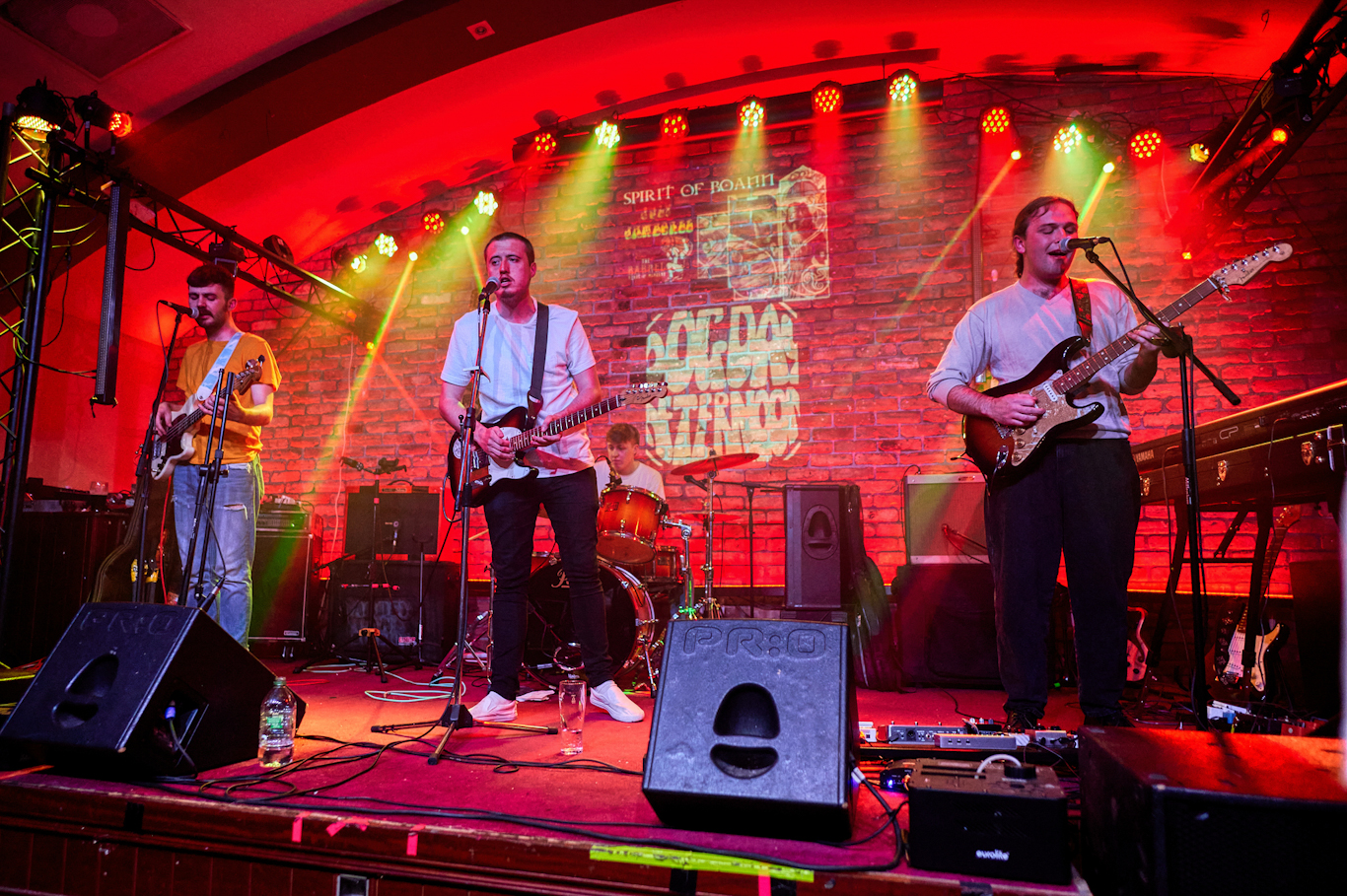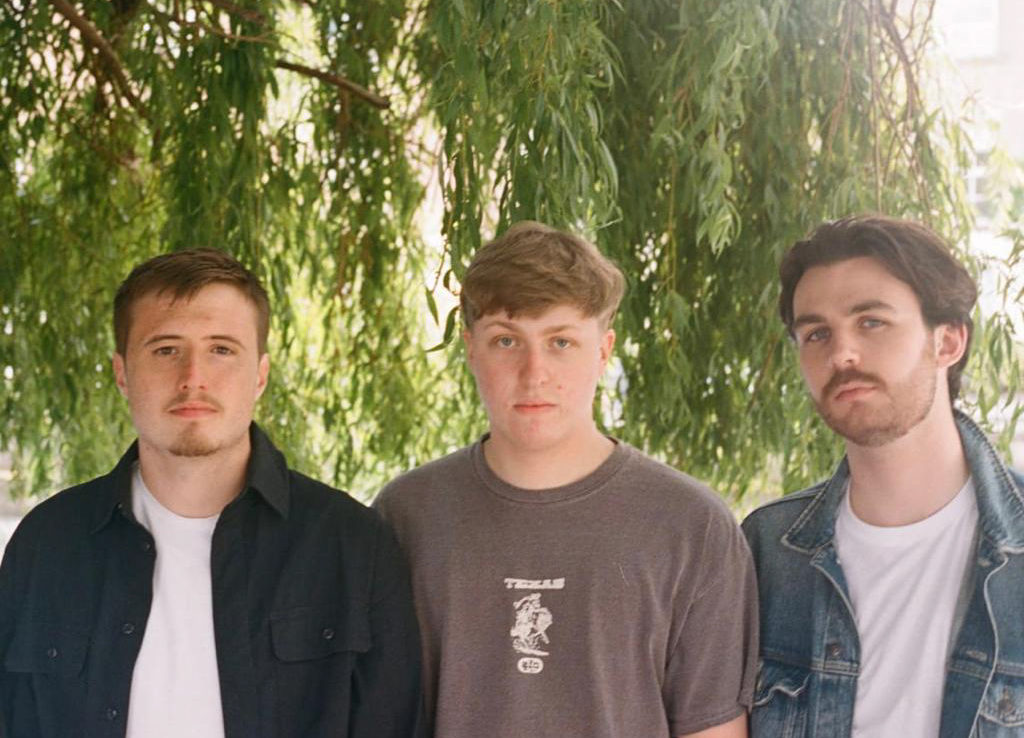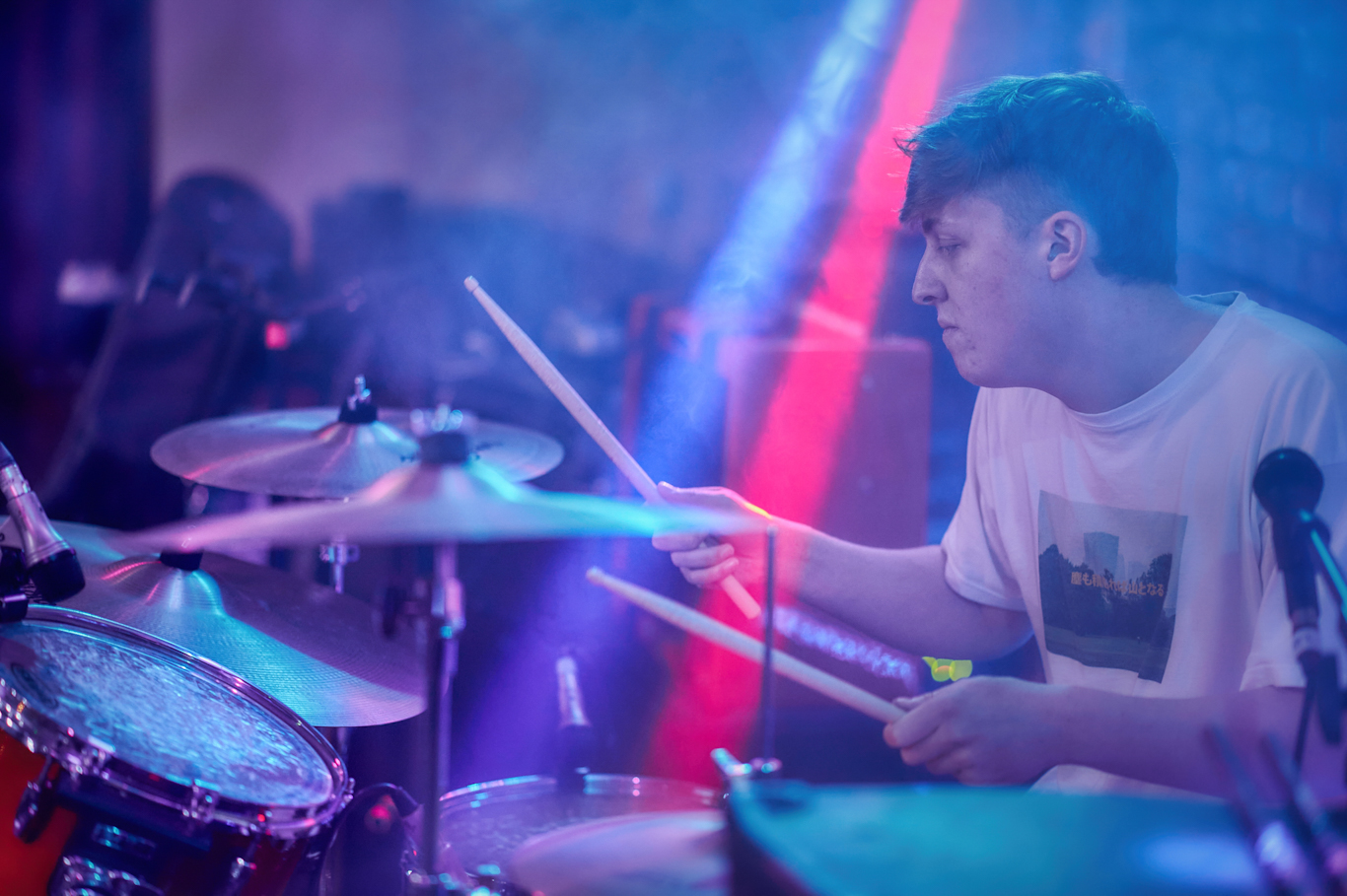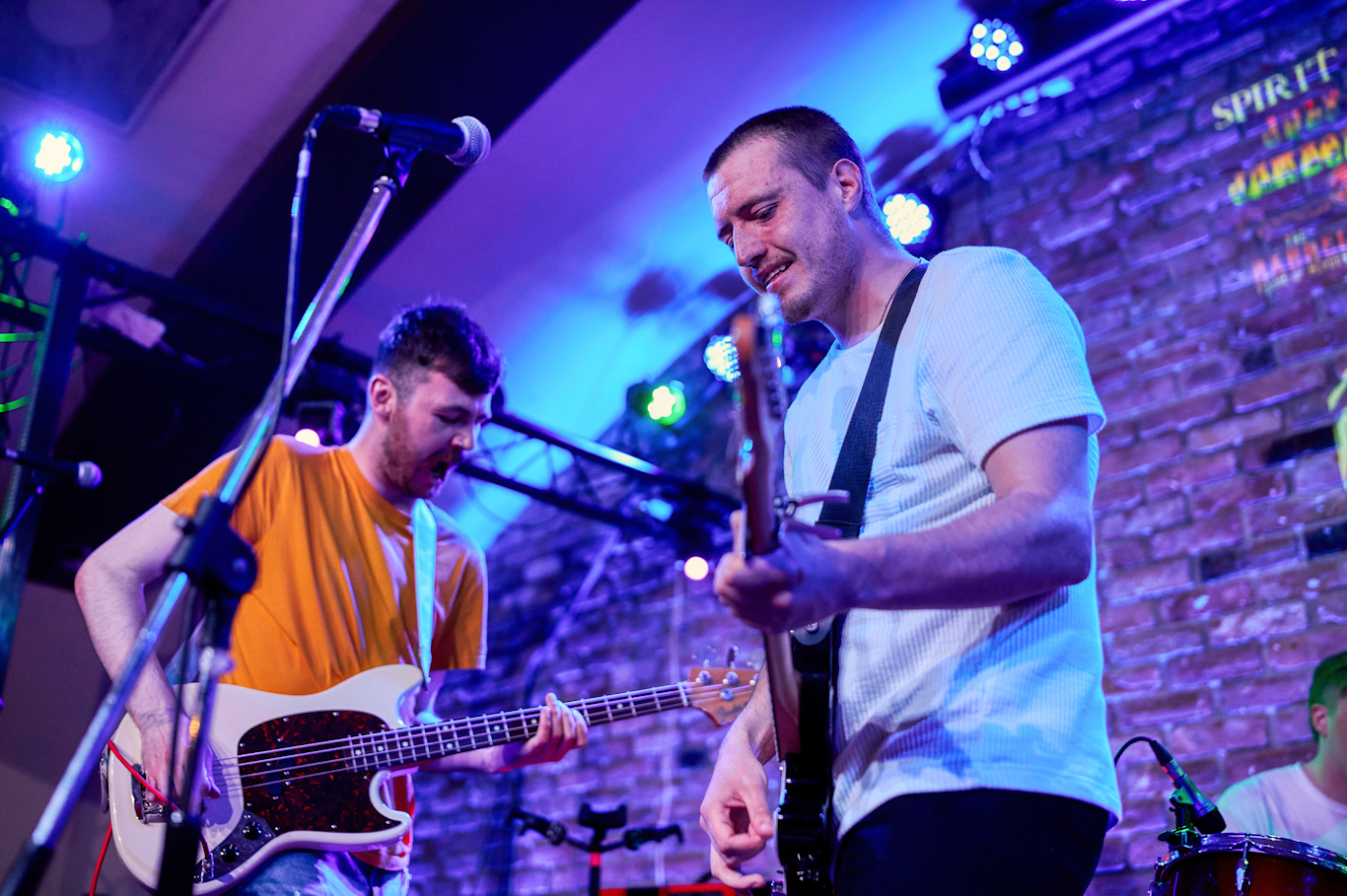
Named after Sidney Lumet’s classic 1975 crime thriller starring Al Pacino, Dog Day Afternoon are an up-and-coming Irish indie act from Dublin and Laois. They have been garnering a lot of attention from continued airplay on Irish radio.
The band caught up with XS Noize writer Aaron Kavanagh at Dublin’s St Stephen’s Green after a radio performance where they discussed their music, forming during the COVID-19 pandemic, meeting at Electric Picnic, their D.I.Y. attitude, the benefits and pitfalls of self-producing and self-releasing, making a name for yourself in a sea of endless competition, the Irish music scene, new media versus old media for publicity, and having the DVD of their namesake for sale on their Spotify page.
The first thing I was interested in asking you guys was how did you meet? Because I know some of you are from Dublin, some are from Laois.
All: Yeah
So how did youse meet up?
Mark Moloney (singer and guitarist): So, originally, I know Aaron from college, and we pretty much got on right away; we immediately bonded over the music we really liked, and then we met Shea actually at Electric Picnic, and we all camped together and then pretty much from there, we just kinda realised, “Alright, we all want to play music, we all want to write songs, so why don’t we all just do it together?” And, like, it came across quite naturally as well, like, it didn’t seem forced or anything; we were all just really up for it, you know?
And that was something I was interested in, you guys formed during the COVID pandemic?
Mark: Yeah.
Which is the first time I’ve heard that. I’ve heard from people who formed just before it, but you guys must have had a shared motivation if you were trying to come together at such a time?
Aaron Marry (bassist): Yeah, more or less. I think with that idea of forming through a pandemic, it kind of gives you a different perspective on how to actually make music and how to perform, because obviously during that time, there are no gigs, there’s no live music, so you’re going to focus entirely on the production side of things, and that’s what we did because we did know each other, we were all friends before the pandemic. Then when lockdown happened, we said, “You know what? Just start a band,” and that’s more or less how it happened.
Mark and Shea Walsh (drummer): Yeah.
I know a lot of people might have said, “Well, we’ll put it off until after the pandemic,” but the fact that youse were so motivated. So, how exactly did youse meet up? Was it all online?
Aaron: So, we did have a few Zoom calls as well. We did DCU Battle of the Bands, which was completely online as well, and that’s kind of what I suppose glued us together as well.
Mark: Yeah.
Aaron: We did have the odd, dare I say, sneaky meet-up as well.
Shea: We were able to get together a few times, like, a few studios stayed open during Level 5, which I don’t think was legal, but…[All laugh]
Aaron: Definitely wasn’t! It definitely wasn’t.
Shea: We were able to meet up a few times. We just love playing together, and that’s what kept us going.
One thing I was interested in was your musical influences. You list everything, from ’80s indie, like The Smiths and R.E.M., and even modern-day indie. What do you think it is about the longevity of that music, and why does it resonates still with young musicians?
Mark: What I can say, completely from my perspective, is that R.E.M. would be one of my favourite bands, especially with Michael Stipe and his lyric style. That’s something that really resonated with me. And I think all of them together, just speaking of R.E.M., is something that I really wanted to bring forward to the table, in terms of one of my influences, like, Peter Buck’s guitar and then Mike Mills on the bass, even. Like, again, all of them just coordinated…I felt like, I dunno, kind of similar with us as well, because them as people, they seemed to have grabbed a lot of influences from different places. Again, Peter Buck picking up the mandolin for “Losing My Religion.” I feel like I wouldn’t put it past us. If we wanted a mandolin on a track, we’d do it. [All laugh] Again, with all of us, we have such a variety of different music that we all listen to, and then we can put them all into the songs, which I think gives it a completely different feel. But, also, it makes us have our own standpoint in terms of our own writing and in terms of even how we want to present ourselves as well.
I think a lot of the time, indie music goes uncredited for its complexity, in a way. If you look at someone like Johnny Marr, for example, or just The Smiths in general, the entire instrumentation it’s very complex. I was wondering because I think a lot of people when they think of dexterity in music and instrumentation, they think of metal, and I often find with metal, they have a complex riff and a complex solo maybe, but most of it is just open E [Laughs].
Aaron: Yeah, more or less.
But a lot of indie music is very active throughout the entire song, so I was wondering when you guys were learning your instruments initially, was that the type of music that you started with because I think that would make me want to quit?
[All laugh]
Aaron: I think it is; between like metal music and indie music, indie music is a lot less niche, for want of a better word. Metal music has its fans and its own niche, so I’m not saying that it’s necessarily a closed genre, but it’s a little more closed-off than, let’s say, indie because, especially with the generation up-and-coming now, they’re starting to expand their horizons, rather than just listen to all this kind of summer hip-hop music. Like, The Smiths [are] a lot [bigger] than they probably ever were. Even looking at Kate Bush, as well, with Stranger Things, “Running Up That Hill,” like that’s finally had its first number one, well, it was a couple of weeks ago. So, I think maybe the whole idea of nostalgia is kind of driving that popularity for indie, as well.
Mark: I think even with Spotify as well, now. Again, in our parents’ day, if you wanted to listen to music, you had to go to a store. You’d have to buy an album and listen to it all the way through. But, with us now, with streaming platforms, any song you want it’s at our fingertip. So, I think even with different playlists and stuff, and you can go through Spotify and that kind of thing, that we can all pretty much listen to anything we want. So, if anyone was to recommend me a song, I can just put it on right there, and I think that’s the beauty, as well, with Spotify and these streaming platforms, is that you can get into such a variety of music so much more easily than you probably could, back in the day. And that’s something that, to be honest, we want to thrive off: we want to try as much things as we can possible; we want to push our own horizons and have each song have its own distinct quality as well. That would be a big thing for us.
I know you guys are doing a lot of radio at the moment, but one thing – because you were talking about the Spotify thing – I think of the opposite side, where even twenty years ago, media, in general, was a lot more centralised: everyone listened to the same radio, watched the same T.V., where now everyone’s sort of doing their own thing, and while there is a liberation in that, how do you make sure as many people are exposed to you as possible?
Mark: Yeah, again…now that these streaming platforms are so open, there definitely is a saturation of artists, and probably, yeah, it’s a lot tougher than maybe it used to be to get the foot in the door, but I suppose with us, we have to let the songs do the talking. With us, we have to just make our best stuff possible, our best way in our way to promote it. Again, if you’re making good music, it’s going to be heard because people will hear it and they’ll recommend it to different people, so again, just the goal, whether it was back then or it is now, is if you’re making great music, great music will always get heard.
Do you want to talk about your two singles [out] at the moment?
Mark: Yeah, so we released “Foolish” last year, during the end of the summer, and that was probably one of the first songs that we all looked at each other and were like, “Yeah, this is definitely going to be the single,” because I think just the raw energy of that track really captures us in a live setting, as well. Like, whenever we close a gig, we play “Foolish”, and the crowd just goes mental.
Aaron: And I suppose we’re kind of feeding off the energy of last summer, I think. Like, everyone was just absolutely aching to get out of their houses from the pandemic, and I suppose we might as well encapsulate that as best as we can through music and “Foolish” was born through that. And with “Lust,” I think “Lust” was more of a mature sound. Our first single, we’re still trying to develop our sound, but “Lust” is more of us finally realising what we do sound like. That’s not to say that all of our songs are going to be in that kind of sound.
Shea: And that was reflected more so in the production because “Foolish” and “Lust” were written around the same time as well, so we’re just learning so much in terms of how to produce a track and record properly and stuff. It’s a huge learning curve.
I find that everyone now – every young musician I talk to – has a D.I.Y. attitude that maybe at one point would have been exclusive to punk or hip-hop, where now every musician, regardless of genre, is doing home recordings, is self-releasing stuff. Why do you think that’s preferable to, say, going the traditional route of trying to sign with a label or something?
Mark: I suppose now, with even the liberation of you can set up your own Spotify, you can do all these things by yourself that maybe a label, twenty or thirty years ago, would have to do for you. So, again, we have our own recording equipment. Literally yesterday, myself and Aaron were recording a song that’s going to be coming out soon enough, and we could just do that just off the fly, like, “Aaron, do you want to come to mine?” Literally, just record a track. So, again, I think the D.I.Y. aspect is that we want to keep our creative control in there also, so we know if all of us are lined up, we know exactly what we want to put on it as well. I think that’s a good thing with us as well, is that like, obviously, we appreciate input from anyone, regardless of the song, but I really like that we just come over to each other’s houses and just put on anything. So, that D.I.Y. approach, I think, is quite integral to us. I’m not going to say we don’t want to sign to a major label now because, again, that would be good for everyone! [All laugh] But I do admire, again, from those genres such as punk and rap, the way that they kind of grabbed it by the roots and [said] that no-one else is going to give it to you, so you might as well do it yourself. So, I think we definitely have an element of that kind of mentality.
Aaron: It does have that…the flipside as well, because music-making [has] now become accessible to more people, more people are indeed making music, therefore there’s more competition as well, so you do have that whole concept of almost fighting for streams, especially in a country so small as Ireland. Even worse, the music industry in Ireland is so small and so confined that you have to almost kick the door down in order to even want to break into it, you know?
Do you think – not to get too political – but do you think the Irish state does enough for musicians?
Aaron: I think they do, but they don’t make – not that they don’t make a big deal about it – but they don’t make it as accessible. There are options for funding, but they’re not very vocal about them.
I think of a regulation in France, which says that French radio has to play so many French artists, like a percentage. The reception seems mixed when I propose that here to musicians I talk to. Some seem in favour of it, think it’s a good idea; some think that it’s kinda token[ism]. How do you guys feel about it? Maybe a certain percentage of Irish radio should be dedicated to up-and-coming artists?
Mark: Well, I think, in terms of the radio stations that we’ve been played on, they’ve been very kind to us, in terms of letting us obviously be on their station. But I think, in here, it is good in a way that bands such as ourselves and other bands that are around with our following can get on Irish radio, but again, I wouldn’t want to put a law down to say, “You have to do this, or you have to do that” for a radio station. Once again, as I said earlier, if it’s good music, it has to be heard. I don’t think anyone wants to put anything on the radio…if someone’s Irish and it’s a terrible song, no one will want to hear it—[Interviewer laughs].
Aaron: Yeah.
Mark: You know? That’s the thing: regardless of where you’re from, if you’re making great music, it has to be out there and, therefore, that’s why the radio stations are going to play it.
Aaron: But, at the end of the day, you do have…There is plenty of really, really good Irish music.
Mark: Absolutely, yeah.
Aaron: And, if a radio station is playing the same ten songs, day in, day out, there has to be some sort of incentive for them to not need to do that or not want to do that, because…while the radio is more or less a dying industry, they are trying to do everything they can in order to save it. If it means playing those top ten songs that everyone is listening to, they’re going to have to do it. And that, I suppose, kind of creates a barricade between those top ten songs and then the rest of, not even just Irish music, but music in general.
Something that I think about is – you guys were talking about how Spotify is used as a platform – but I was recently interested in certain artists like Neil Young, for example, and Joni Mitchell pulling their music [from Spotify]. While everyone – you were talking about self-releasing music – has the freedom to do that, is it a viable option? Do you think, if, say, for example, a young artist had an opposition to a certain platform and wanted to pull their music, could you pull it from Spotify or YouTube, or do you think that’s really possible?
Mark: Well, of course, you can. Again, anyone’s free to do what they want, but, again, I think the music industry in the last ten years has just shifted so much that, for every artist, I recommend to get your stuff up online because that’s where everyone is now. Everything is just online. And, in order for your music to get out there, you’re going to have to do it, even if you may not like it, but if you have certain goals to reach a certain step, that’s probably something you’re going to have to do. But, again, if you don’t want to put it up there, fair enough as well.
Aaron: It is down to the artists, but…
Mark: It’s down to the artist, yeah. Preference, really.
Aaron: Yeah. You do have to give yourself every – if you want to make a living out of this – you have to give yourself every available opportunity. And, as much as I hate to say it, even if that means compromising some of your beliefs or some of your, I suppose, your morals, it does kind of have to be done, and as much as it pains me to say that, that that’s the state we do live in, it does have to be done.
Mark: But, again, I don’t think you should like, “Sell yourself out completely.”
Aaron: Absolutely.
Mark: You know, like, again, with music because, again, we’re writing this stuff, and it’s very personal to us, and we put so much effort and work into it. Again, our number one thing is us having integrity as a group and showing us as the best way possible. So, again, I think it’s really down to the artist’s preference. Yeah.
Speaking of preference, you guys were talking about doing some self-producing. Are there any producers that influenced the way you guys want your music to sound, or are there any producers that you would like to work with in the future?
Mark: Oh. Producers, to work with? My God…
Aaron: I don’t think we really know any producers, specifically [Laughs]. Like, “famous producers,” I suppose, for want of a better word. We do have our own producer, Rhyss.
Mark: So, Rhyss Davies and Clodagh Bergin; they’ve been great to us in terms of helping us get our stuff out, so, again, big ups to them. But, again, at the moment, we have a good working relationship with those people, you know? But, I’d say, like any famous producers? I’d say; honestly, one of my top well-produced albums is, I’d say, honestly Nevermind by Nirvana. I know it’s just obviously a huge album, but…
Butch Vig?
Mark: But, Butch Vig, the way he would experiment with different dynamics and all that to, like, really encompass that sound, I think, was just amazing. And it just stands…well, Nevermind stands the test of time, just because of the production and I don’t think people realise, when they’re listening to music, maybe if they’re not properly into music…Oh, my God, there’s a wasp there!
Shea: There’s a wasp.
Aaron: Being attacked.
Mark: I don’t think they realise how important a producer is as well.
Aaron: They can really stamp their style on…like, there’s only so much that the instrumentalists and the vocalists can do in order to, I suppose, cement their style. If you have your own producer who knows exactly what you want and how you want it, that’s half the battle, to be honest.
Mark: I’d say with hip-hop and everything, it’s just so much more evident the producer’s role. But, with rock and everything else, again, it’s just, it depends, genre to genre, I suppose, with the producer’s role. Again, the people that have worked with us, like Rhyss Davies and Clodagh, they have been so good to us. So, again, if we want to get with any famous producers, hopefully, that comes our way, you know? [Laughs]
I talked with Eoin [Maxwell, the band’s manager] just before we began. He was saying that you guys are planning on recording a music video soon. Could you tell us about that?
Mark: Yeah, absolutely. So, that would be for our new single, “Lust.” So, again, it would be the first video that we’re ever going to do.
Aaron: Yeah. It’s a bit of a…it’s, yeah…Do we know what we’re doing? Not really. Are we gonna act like we know what we’re doing? Kind of, I guess.
Mark: But, sure, we’ve gotten this far, you know?
Aaron: Yeah. [Laughs]
Mark: Exactly. [Laughs]
Is that going to be self-produced, or is that with a production company?
Shea: Self-produced.
Mark: Self-produced, yeah. Self-produced.
Cool. What are the plans for future releases, then?
Mark: Well, for future releases, our goal is probably to have a single probably out at the end of August.
Aaron: Gig as much as we can in the meantime. Just gig as much as we can.
Mark: Yeah. ‘Cause again, we formed over lockdown, so again, gigs were obviously hard to come by then, so again, we’re just trying to play as much as we can. That is really our goal: just play as much music as we can and just get the name out there.
That is crazy because that’s how I started the interview was talking about that [forming during lockdown], and you’re saying you can’t gig. And that was a huge hurdle I was talking [about], even with established musicians, “Oh, I can’t make money, I can’t…,” but you guys are in an even less enviable position, where it’s like you don’t even have your name out there yet…
All: Yeah.
…and you can’t gig or anything…
All: Yeah.
…so, how do you work around that, I guess, during a lockdown?
Mark: Again, it takes hard work because obviously, we’re still growing as a band, and whenever we kind of really play gigs with different people, again, with the community we have within the Dublin music scene, they are very giving in terms of, “If you play a gig with us, we’ll play a gig with you” and it just kind of switches around like that. And the more you’re kind of in the scene itself, so going to gigs of other artists, you’re speaking to more people and networking in that kind of way.
Shea: And even outside of music entirely, it’s about building an image online as well, on all your social media platforms. Putting content up, pumping it out.
Aaron: Like, back maybe twenty years ago, the only way of making a name for yourself was being played on radio and selling records. Now, it’s streaming and having an online presence and creating your own style within that, you know?
You were talking about how everyone has an eclectic taste now because of Spotify. Do you think live gigs are like that, or do you think people are still kind of segregated into their genre – so, indie night, metal night, hip-hop night – or do you think it’s all just kind of blended together now?
Mark: Em…
Aaron: Yes and no.
Mark: Yeah. Yes and no.
Aaron: Everyone’s going to have their niche, everyone’s going to have their favourite type of gig to go to, their favourite genre. But I’ve noticed – again, me personally – that a lot more people are a lot more open to a lot of different genres. And that could be because of the whole Spotify, Apple Music recommendations, and your daily playlists. Everything in-between that…
Shea: And with those small, up-and-coming gigs that we started out playing as well, you just have an absolute mixing pot of genres on a headline…On the bill, you’ll have like a hip-hop group and a rock group and everything, like a shoegaze group. It’ll be a complete mix, a huge mix of music on the night.
Mark: And just showing, again, the local talent, regardless of genre. Whatever local talent is out there, get them on the stage. Because, again, like the gigs that we’ve played, they’ve been unbelievable. Like, the crowd and everything. You know, that’s what we feed off of because we’re just pure energy when we’re up there.
Yeah, I think it’s amazing how take Dublin, you know, relatively small, you know? But like [look at] how many really good but unknown artists you can see on, like, a Friday night if you just walk into the right club, and it’s so crazy.
Mark: Yeah, and that’s something that I’d encourage everyone to do. Like, maybe you can’t afford a ticket into the 3Arena that costs maybe eighty quid? Go to the band down the road; they’re giving tickets for a fiver, and they’re great.
Well, this has been a great interview. Is there anything you’d like to add before we wrap up?
Mark: Yeah, so we have a new single just put out called “Lust.” That’s all on major streaming platforms. And we’re playing in Fibber Magees on the 11th of August, and we’re playing The Grand Social on the 22nd, and we’re playing The Grand Social again on the 23rd. And that’s in association with Breaking Sound U.K., and if you want to buy any tickets, it’s on our Instagram page on our bio.
Aaron: Our Instagram page is @dogdayafternoonmusic, and our Twitter @DDAnotthemovie [Laughs].
[Laughs] Actually, that was one last thing…
All: Yeah, yeah!
…when I went to your Spotify, on the merchandise section [the Dog Day Afternoon DVD was for sale]…
[All laugh]
Was that on you guys? [Laughs]
Aaron: Ah, yeah!
[All laugh and talk over each other]
Aaron: Al Pacino should be paying us for the promo rights!
Shea: If anyone brings us up on it, we’ll know we’ve made it big!
Mark: Oh, no. If we get sued for the name, we’ll known we’ve made it! [All laugh]
Alright. Thanks a lot, guys.
Shea: Cheers, Aaron [Kavanagh, the Interviewer].
Aaron: Thank you very much.
Mark: Thank you.
You can follow Dog Day Afternoon on Twitter, Instagram and Facebook for updates on their latest releases and information on live dates. Their latest single, “Lust”, is available to stream now.





Be the first to comment